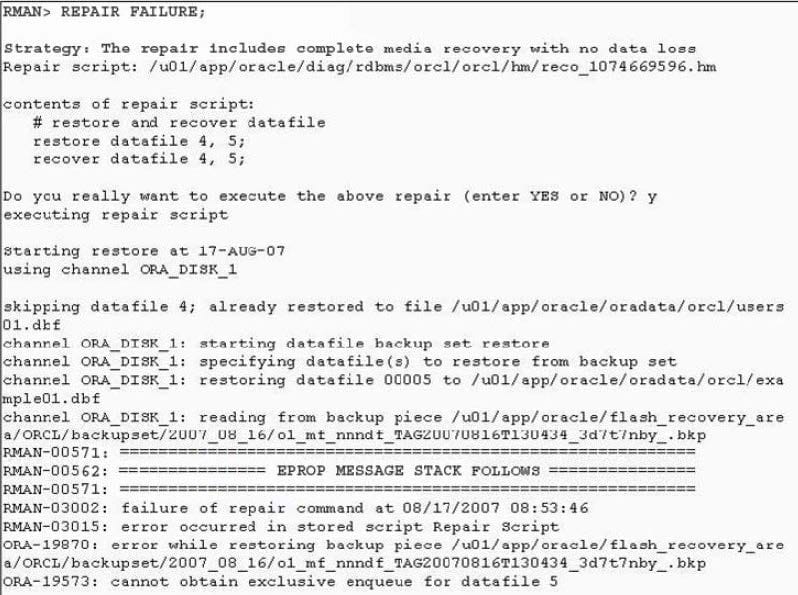Exam Details
Exam Code
:1Z0-053Exam Name
:Oracle Database 11g: Administration IICertification
:Oracle CertificationsVendor
:OracleTotal Questions
:736 Q&AsLast Updated
:Jun 27, 2025
Oracle Oracle Certifications 1Z0-053 Questions & Answers
-
Question 261:
What view would you use to determine if a given tablespace is fully self-contained for the execution of a tablespace point-in-time recovery?
A. TS_CHECK
B. TPITR_CHECK
C. TS_PITR_CHECK
D. CHECK_TSPITR
E. PITR_TS_CHECK
-
Question 262:
Which command would correctly start a TSPITR of the USERS tablespace?

A. B. C. D. E.
-
Question 263:
What RMAN command is used to execute a tablespace point-in-time recovery?
A. recover
B. duplicate
C. restore
D. copy
E. None of the above
-
Question 264:
Which options must you configure while performing an automated Tablespace Point-in-Time Recovery (TSPITR) by using Recovery Manager (RMAN)?
A. New channels for restore and recovery tasks
B. New name for the data files of the tablespace
C. Auxiliary name for the data files of the tablespace
D. Auxiliary destinations for an auxiliary set of data files
-
Question 265:
In your production database, users report that they are unable to generate reports on an important table because it does not contain any data. While investigating the reason, you realize that another user executed the TRUNCATE TABLE command, which accidentally caused the data to be lost. Now you want to recover the lost data of the table without affecting objects in other schemas.
Which method must you use to recover the lost data?
A. Complete Recovery with online redo log
B. Complete Recovery with archived redo log
C. Tablespace Point-in-Time Recovery (TSPITR)
D. Incomplete Recovery with system change number (SCN)
-
Question 266:
Because of a logical corruption in the EMPLOYES tables, you want to perform Tablespace Point-in-Time Recovery (TSPITR) to recover the table. Before you started the TSPITR process, you queried the TS_PITR_CHECK view and you realized that the table has a referential constraint with DEPARTMENTS that exists in another tablespace, MASTERTBS.
Which two actions will permit the TSPITR to work? (Choose two.)
A. Taking the MASTERTBS tablespace offline
B. Dropping the relationship between the tables
C. Adding the MASTERTBS tablespace to the recovery set
D. Putting the MASTERTBS tablespace in read-only mode
-
Question 267:
You are managing an Oracle Database 11g instance. You want to create a duplicate database for testing purpose. What are the prerequisites for performing the active database duplication? (Choose all that apply.)
A. The source database backup must be copied over the net for test database.
B. The source database must be run in ARCHIVELOG mode if the database is open.
C. The source database must be shut down cleanly if the database is in mounted state.
D. A net service name should be set up and a listener configured with the target as well as the source database.
-
Question 268:
View the Exhibit to examine the error while executing the REPAIR FAILURE command in an RMAN session.
What is the reason for this error?
Exhibit:

A. Another repair session is running concurrently.
B. The failure ID has not been mentioned in the command for data file 5.
C. There are new failures recorded in the Automatic Diagnostic Repository (ADR).
D. The ADVISE FAILURE command has not been issued before the REPAIR FAILURE command.
-
Question 269:
Examine the following command for RMAN backup:
RMAN> RUN {
ALLOCATE CHANNEL c1 DEVICE TYPE sbt;
ALLOCATE CHANNEL c2 DEVICE TYPE sbt;
ALLOCATE CHANNEL c3 DEVICE TYPE sbt;
BACKUP
INCREMENTAL LEVEL = 0
(DATAFILE 1,4,5 CHANNEL c1)
(DATAFILE 2,3,9 CHANNEL c2)
(DATAFILE 6,7,8 CHANNEL c3);
SQL 'ALTER SYSTEM ARCHIVE LOG CURRENT';
}
Which statement Is true regarding the approach in the command?
A. The RMAN multiplexing level is 4.
B. It is the use of asynchronous I/O by RMAN.
C. It is a case of parallelization of the backup set.
D. It is an implementation of a multisection backup.
-
Question 270:
You execute the following command to set the redundancy retention policy in Recovery Manager (RMAN): RMAN> CONFIGURE RETENTION POLICY TO REDUNDANCY 3;
Identify the statement that correctly describes the implications of this command.
A. when there are already three backups, for the fourth backup RMAN removes the oldest backup.
B. When there are already three backups, for the fourth backup RMAN marks the oldest backup as obsolete.
C. the number of backups that are retained is equal to three and it includes full, incremental, and cumulative backups.
D. when there are already three backup, one of the existing backups must be removed manually before taking the fourth backup.
Related Exams:
1Z0-020
Oracle8i: New Features for Administrators1Z0-023
Architecture and Administration1Z0-024
Performance Tuning1Z0-025
Backup and Recovery1Z0-026
Network Administration1Z0-034
Upgrade Oracle9i/10g OCA to Oracle Database OCP1Z0-036
Managing Oracle9i on Linux1Z0-041
Oracle Database 10g: DBA Assessment1Z0-052
Oracle Database 11g: Administration Workshop I1Z0-053
Oracle Database 11g: Administration II
Tips on How to Prepare for the Exams
Nowadays, the certification exams become more and more important and required by more and more enterprises when applying for a job. But how to prepare for the exam effectively? How to prepare for the exam in a short time with less efforts? How to get a ideal result and how to find the most reliable resources? Here on Vcedump.com, you will find all the answers. Vcedump.com provide not only Oracle exam questions, answers and explanations but also complete assistance on your exam preparation and certification application. If you are confused on your 1Z0-053 exam preparations and Oracle certification application, do not hesitate to visit our Vcedump.com to find your solutions here.